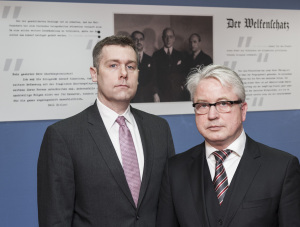The U.S. Court of Appeals for the D.C. Circuit recently dismissed a long-running dispute against Russia concerning the library of the Lubavitcher Rebbe (the Library), a collection of books and papers once held by the then-Rebbe of the Chabad Lubavitch movement. Agudas Chasidei Chabad of United States v. Russian Fed’n, 110 F.4th 242 (D.C. Cir. 2024) (Chabad 2024). Brought under what is known as the expropriation exception, 28 U.S.C. § 1605(a)(3), of the Foreign Sovereign Immunities Act (the FSIA), the case has involved Russia’s withdrawal from the case and default, sanctions of $50,000 per day for non-compliance and a judgment of more than $175 million, a retaliatory embargo on cultural property exchange that continues to this day, and multiple appeals.
In the most recent decision, the court of appeals held that the second element of the expropriation exception (what is known as the commercial nexus requirement) was not met and therefore deprived the court of any jurisdiction. Specifically, the D.C. Circuit held that if the defendant is the foreign state, the expropriation exception may only be invoked if the property is physically present in the United States (which the Rebbe’s library is not). The Supreme Court has declined to review two relatively recent cases that reached the same conclusion, it will bear watching of the plaintiffs seek further review now given a circuit split with the 9th Circuit on the issue.
Read More
Topics:
de Csepel,
Immunity from Seizure,
Foreign Sovereign Immunities Act,
Supreme Court,
Agudas Chasidei Chabad,
Russian Federation,
FSIA,
expropriation exception”,
sovereign immunity,
Russian State Library,
Chabad,
Federal Republic of Germany,
Welfenschatz,
D.C. Circuit,
Federal Republic of Germany v. Philipp,
Simon v. Republic of Hungary,
Lubavitcher Rebbe,
Schubarth,
Judge Randolph,
Brett Kavanaugh,
Judge Griffith
(WASHINGTON-July 2, 2020) The United States Supreme Court today agreed to hear the appeal by Germany and the Stiftung Preussischer Kulturbesitz (SPK) seeking to dismiss the restitution claim by the heirs to the so-called Guelph Treasure (known in German as the Welfenschatz). The claims arise out of the forced transfer in 1935 of the Guelph Treasure by a consortium of Jewish art dealers to agents of Hermann Goering, who personally presented it as a gift to Hitler. In 2018, the Court of Appeals for the D.C. Circuit held that U.S. courts have jurisdiction over the claim under the Foreign Sovereign Immunities Act of 1976 (FSIA). That appellate court had rejected the Defendants’ arguments that U.S. courts lack jurisdiction, and that Germany’s treatment of its Jews in the 1930s should be immune from judicial scrutiny.
Sullivan partner Nicholas M. O’Donnell said, “we are grateful for the opportunity to address the Supreme Court on these important questions about holding Germany accountable for its Nazi-looted art. A 1935 transfer from German Jews to notorious art looter and war criminal Hermann Goering is the quintessential crime against international law, regardless of Germany’s Holocaust distortion in defending this case. Germany seeks to eliminate recourse for Nazi-looted art and the Court will have the chance to answer this question of critical importance for Holocaust victims.” O’Donnell added, “this is also an opportunity to rebuke the Department of Justice and State Department, who turned their back on decades of U.S. policy by siding with Germany’s effort to keep Nazi-looted art.”
Read More
Topics:
United States Supreme Court,
Nazi-looted art,
Department of Justice,
SPK,
Stiftung Preussischer Kulturbesitz,
Hermann Goering,
NS Raubkunst,
Gerald Stiebel,
Prussian Cultural Heritage Foundation,
Federal Republic of Germany,
Alan Philipp,
Welfenschatz,
State Department,
Paul Körner,
Jed Leiber

Late Tuesday evening—the day after Memorial Day no less—the United States Office of the Solicitor General filed a brief amicus curiae in our clients’ pending case against the Federal Republic of Germany and the Stiftung Preussischer Kulturbesitz for restitution of the Guelph Treasure (in German, the Welfenschatz). This brief was in response to the Supreme Court’s invitation in January that the SG file a brief expressing the views of the United States. In an unprecedented abdication of 80 years of leadership redressing Nazi-looted art, the Solicitor General argued that there is no circumstance in which a Nazi-forced sale victimizing a German Jew in the 1930s could constitute a violation of international law such the Foreign Sovereign Immunities Act would confer jurisdiction over either Germany or the SPK. The U.S. government has taken the position that only property claims against non-Germans suffice—even though, of course, the U.S. government has acknowledged in every relevant context since the early 1940s that Jews ceased to be full members of German society on the day Hitler assumed power: January 30, 1933. This is an historic disgrace. Germany has rightly been shamed for minimizing in court over the last five years the genocidal character of its persecution against Jews, but for the United States to do so the day after we rightly honored the hundreds of thousands of Americans who died to defeat Nazi Germany is appalling.
Read More
Topics:
Monuments Men,
Foreign Sovereign Immunities Act,
Washington Conference on Holocaust Era Assets,
Supreme Court,
Holocaust Victims Redress Act,
Stiftung Preussischer Kulturbesitz,
Hermann Goering,
FSIA,
Monuments Fine Arts and Archives Program,
Washington Principles,
Federal Republic of Germany,
Welfenschatz,
Military Government Law 59,
Holocaust Expropriated Art Recovery Act,
HEAR Act,
Wannsee Conference,
D.C. Circuit,
Military Government Law No. 59,
london declaration
A federal appeals court has upheld the growing consensus that the Foreign Sovereign Immunities Act (FSIA) confers jurisdiction over foreign state actors in possession of art allegedly looted by and/or overseen by the Nazis. Upholding last year’s District Court decision, the U.S. Court of Appeals for the D.C. Circuit affirmed the ruling in De Csepel v. Republic of Hungary that denied several Budapest museums’ motion to dismiss, while allowing the Republic of Hungary itself out of the case. This is the heirs second successful trip to the appellate court, where their claims were upheld in 2013. The case is the subject of a chapter in my newly-released book A Tragic Fate--Law and Ethics in the Battle Over Nazi-Looted Art (ABA Publishing).
Read More
Topics:
Berlin,
David de Csepel,
Angela Maria Herzog,
Thyssen-Bornemisza Collection,
Foreign Sovereign Immunities Act,
Baron Herzog,
Budapest University of Technology and Economics,
Hungarian National Gallery,
SPK,
Stiftung Preussischer Kulturbesitz,
Budapest Museum of Fine Arts,
FSIA,
expropriation exception”,
Cassirer v. Kingdom of Spain,
Federal Republic of Germany,
András Herzog,
Welfenschatz,
genocide
Under Landmark Ruling, Germany Must Now Defend Nazi-Looted Art Claims in U.S. Court
WASHINGTON (March 31, 2017)- The United States District Court for the District of Columbia has ruled that claims over the famed Guelph Treasure can proceed against Germany in a United States court. This is the first time Germany will have to defend itself in the U.S. against allegations of looted Nazi art and artifacts. The claims arise out of the 1935 forced sale by a consortium of Jewish art dealers to Hermann Goering’s minions of the famed collection of medieval artifacts known as the Guelph Treasure. The claims were filed by clients of Sullivan & Worcester LLP against the Federal Republic of Germany and the Prussian Cultural Heritage Foundation (the Stiftung Preussischer Kulturbesitz, or SPK). The court rejected the Defendants’ arguments that they are immune from suit and held that the Plaintiffs’ claims can be considered a taking of property in violation of international law for the purpose of evaluating the court’s jurisdiction over Germany and the SPK.. Jed Leiber, Alan Philipp, and Gerald Stiebel may now proceed to litigate their claims for their property’s rightful return. Leiber, Philipp, and Stiebel are also represented by S&W’s co-counsel in this matter, Markus Stötzel and Mel Urbach, experienced counselors in the return of Nazi-looted art who have been fighting this case for over eight years and who decried Germany continuing to defend the Nazis’ and Herman Goering’s theft from Jews.
Read More
Topics:
Nazi-looted art,
Foreign Sovereign Immunities Act,
Mel Urbach,
SPK,
Stiftung Preussischer Kulturbesitz,
Hermann Goering,
FSIA,
expropriation exception”,
NS Raubkunst,
J.S. Goldschmidt,
Markus Stötzel,
Saemy Rosenberg,
Adolf Hitler,
Federal Republic of Germany,
Zacharias Hackenbroch,
Nicholas M. O'Donnell,
Welfenschatz,
I. Rosenbaum,
Paul Körner,
Wannsee Conference
Immediately Squanders Market Opportunities Created by Brexit
On a historic day in the European Union, Germany quietly enacted the revised Cultural Property Protection Law (Kulturgutschutzgesetz) that has sparked much controversy in recent months. On the very day that the United Kingdom’s vote to leave the European Union raises myriad questions about the effect on London in particular as a world center of the art market (see here for the terrific first take by our friends at Boodle Hatfield in London), Germany ironically has passed a law that will prevent it from stepping into any of the likely market void left by Britain's EU exit. While Germany is not alone in cultural property protection laws of this sort, it is a silly and unnecessary regulation that will undercut the German art market—as vocally proclaimed by German art market players themselves. In the art world, it was a regressive day on the eastern side of the Atlantic and a huge opportunity lost for Germany.
Read More
Topics:
Germany,
France,
England,
Kulturgutschutzgesetz,
Federal Republic of Germany,
Cultural Property Protection Law,
Brexit,
Export Restriction,
European Union,
Joan of Arc
Sophisticated Analysis of Adolph von Menzel Drawing Distinguishes Itself from Recent Revisionism Elsewhere
As the original term of the Gurlitt Task Force (Taskforce Schwabinger Kunstfund) winds down, the panel has issued a report on a work that it deems appropriate for restitution: Interior of a Gothic Church (Inneres einer gottischen Kirche) by Adolph von Menzel (pencil drawing, signed/dated 1874). The drawing has been called Church in Hofgastein in some English language articles.
Read More
Topics:
Interior of a Gothic Church,
Hildebrand Gurlitt,
Cornelius Gurlitt,
Nazi Germany,
Inneres einer gottischen Kirche,
Dresden,
Gurlitt Task Force,
Adolph von Menzel,
Nazi-looted art,
Gurlitt Collection,
Ernst Julius Wolffson,
Washington Principles on Nazi-Looted Art,
Advisory Commission,
Munich,
Albert Martin Wolffson,
Salzburg,
Restitution,
Catrin Lorch,
Bavaria,
World War II,
Switzerland,
Süddeutsche Zeitung,
Austria,
Kunstmuseum Bern,
Federal Republic of Germany,
Raubkunst,
Taskforce Schwabinger Kunstfund,
Elsa Helene Cohen,
Limbach Commission,
Jörg Häntzschel
Germany Runs Counter to 20 Years of International Commitments
As readers know, my clients Alan Philipp and Gerald Stiebel sued the Federal Republic of Germany and the Stiftung Preussischer Kulturbesitz (SPK) in February for restitution of the Guelph Treasure (or Welfenschatz as it is known in Germany), assisted by my co-counsel Mel Urbach, Esq. and Markus Stötzel of Marburg, Germany. As my co-counsel speak to an event tonight hosted by Congresswoman Grace Meng on the anniversary of Kristallnacht, an event inextricable to the persecution of Jews in Europe, Germany’s response to the Complaint advances a stunning revisionism about the Holocaust and the international commitments that Germany has made. While paying lip service to the seriousness of Jewish suffering, the papers filed in court are nothing less than an attempt to move the goalposts to exempt a historical period from responsibility about which there can be no serious debate. Independent condemnation was not far behind the filing.
Read More
Topics:
Grace Meng,
Simon Wiesenthal Center,
Shoah,
Adolph von Menzel,
Hans Sachs,
Washington Principles on Nazi-Looted Art,
1943 London Inter-Allied Declaration,
Dachau,
Holocaust,
Mel Urbach,
SPK,
George Eduard Behrens,
Nuremberg race laws,
Holocaust revisionism,
Stiftung Preussischer Kulturbesitz,
Marburg,
Restitution,
Los Angeles,
Gerald Stiebel,
World War II,
Markus Stötzel,
Saemy Rosenberg,
Deutsches Historisches Museum,
Reichskristallnacht,
Isaac Rosenbaum,
Lucie Ruth Hackenbroch,
Federal Republic of Germany,
Zacharias Hackenbroch,
Pariser Wochentag,
Rabbi Abraham Cooper,
Paris Weekday,
Alan Philipp,
Welfenschatz,
Military Government Law 59,
Frankfurt
The U.S. House of Representatives passed yesterday H.R. 889, the Foreign Cultural Exchange Jurisdictional Clarification Act for the third time in four years. Identical bills passed the house in early 2012 and again last year but failed to win passage in the Senate and signature by the President, thus expiring without becoming a law (and remaining just a bill sitting on Capitol Hill). Will it become law? Probably not, and after a little reflection and evolution, that’s probably for the best.
Read More
Topics:
U.S. House of Representatives,
Foreign Cultural Exchange Jurisdictional Clarifica,
Second Hickenlooper Amendment,
Russia,
Herrick Feinstein,
Nazi-looted art,
Konowaloff,
Stiftung Preussischer Kulturbesitz,
Association of Art Museum Directors,
Restitution,
World War II,
Foreign Sovereign Immunities,
act of state doctrine,
Senate,
Altmann v. Republic of Austria,
Capitol Hill,
Immunity from Seizure Act,
Chabad,
Federal Republic of Germany,
28 U.S.C. § 1605,
Welfenschatz,
Foreign Cultural Exchange Jurisdictional Immunity,
Mari-Claudia Jiménez,
Cuba
Read More
Topics:
Maria Altmann,
Frankfurter Allgemeine Zeitung,
National Socialists,
Third Reich,
artdaily.org,
Reuters,
United States Supreme Court,
Gestapo,
Haaretz,
Deutschlandradio. Deutsche Presse Agentur,
Robin Young,
the Guardian,
The Art Newspaper,
Foreign Sovereign Immunities Act,
The Wall Street Journal,
Deutsche Welle,
Santa Fe,
KRQE News 13,
the Observer,
Markus Stoetzel,
Die Erle,
Mel Urbach,
Nazis,
Advisory Commission,
3SAT,
ZDF,
Stiftung Preussischer Kulturbesitz,
Washington DC,
Hermann Goering,
Private Wealth,
Restitution,
Sullivan & Worcester LLP,
Here & Now,
Gerald Stiebel,
World War II,
Foreign Sovereign Immunities,
flight tax,
Süddeutsche Zeitung,
Adolf Hitler,
United States District Court,
The New York Times,
Federal Republic of Germany,
BBC News Europe,
Alan Phillip,
Welfenschatz,
NPR,
PrivateArtInvestor,
ArtNet news







